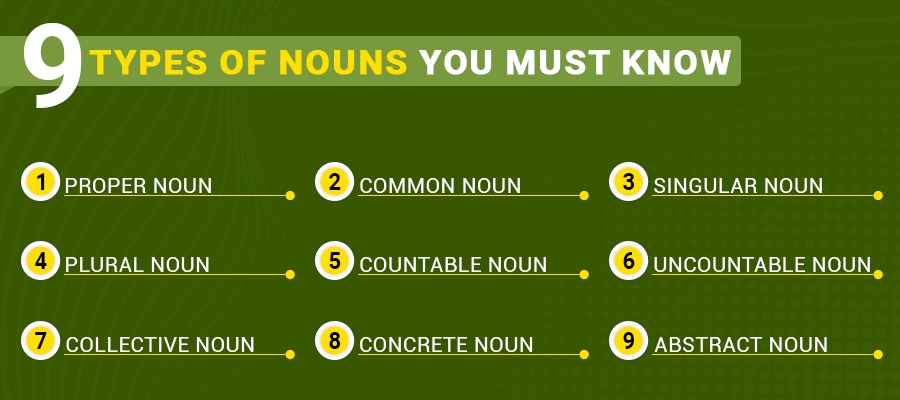 Offers
New
Order Now
Offers
New
Order Now
The first thing one might wonder is: what is a noun? One of the most crucial parts of speech is a Noun. Simply put, it is a word that names a place, person, thing or any idea. We use it very frequently in almost all sentences. To describe an idea, object, place or people around us. Hence, this makes it a building block of any language. It forms the very core of any grammar topic. To improve grammar skills or form clear sentences, learning the use of this part of speech is important. Hence, this blog will lay out all the information that one needs to know about it.
A noun is something that names a place, person, living being, thing or concept. Further, it can serve as both a subject and an object to the sentence. This makes it the most important part of the whole sentence. Moreover, without it, the sentence might not be able to make complete sense. Here is a noun examples, “The cat is hungry," the cat is a noun that is acting as a subject. But in another example, “ The students have a book”, here the it is an object, that is the book. So, in simple words, it helps in identifying and talking about everything around us.
Further, there are many different kinds of nouns, each with its own unique purpose. So, let's move forward and understand the different kinds of it and see how they help in creating a perfect and sensible sentence.
Take Our ServicesThere are many different types of nouns used in the English language. Each has its role in helping to communicate the idea better. Each of them serves as a crucial part of the sentence, helping one express ideas nicely. Some of them help in naming objects or identifying people or places. Moreover, the aim is to improve the sentence structure and give meaning to it. So, by understanding the different types of it, one can express ideas more easily and in a better way. Hence, let's have a look at the types of nouns:

This refers to a particular person, place or thing. And it always starts with a capital letter. For instance, Ken, Lyon or Chrome—all of these are proper nouns. These help in differentiating between various things and people. Rather than categorising them into general categories, it uses special names to be more precise and apt.
This is used for general things, items, places or people. So, it denotes the normal things we all see around us. Like a cat, car or house. These are not written in capital letters, unlike the proper nouns. Until and unless they begin the sentence, they generalise.
So, this refers to the one thing, idea, person or place. It is used while talking about individual or singular ideas. For instance, a child, a book or a song. These are used to denote a single unit of anything; this helps in differentiating these from the plural.
Thistalks about more than one place, person or idea. One can find this type ending with a -s or -es. So, cats, hens, trees and more are plural. This allows one to talk about different items at the same time. Unlike singular, these can talk about a variety of things and items in one go.
These are the ones that can be counted individually. For example students, glasses, or houses. Further, they can have both singular and plural forms. One can use them while counting things. So basically, this helps in easily quantifying things.
These represent the things that can not be counted. For instance snow, water, happiness, or any emotions. These can not be counted as single units, but they do not have a plural for as well. Hence, these are measured considering their quantity, like a cup of tea or a bag of rice.
This refers to a collective of people, animals or things. But here things are classified while also considering them as a single unit. For instance, words like team, flock or family are collective ones. Although one refers to them in groups, they are still seen as individual items when one considers the verb agreement.
These are the ones that can be experienced through the sense. The five senses are smell, touch, taste, sign and hearing. So, an organ, music or a flower are all concrete nouns. These talk about physical objects and the things that can be perceived in the real world.
These as the name suggests, talk about ideas, states or qualities that cannot be seen with the naked eye. But these also include the things that can be felt. For instance love, air or freedom. These help in discussing the different layers of concepts and emotions and help to communicate better.
So, all these types help explain the more complex ideas around us. Further, they make conveying more simpler and effective. As they help in conveying the ideas better. So, now let's have a look at the rules that one must understand before using these in sentences. For more such tips or for any writing need, you can seek online homework help from our experts. But what is basic that you must know is the 6 important rules of noun. Take a glance by reading the next section.
Mastering nouns is the only way to make clear and sensible sentences. So, first one needs to clearly understand what is a noun. But more importantly, one needs to focus on how to use it. Some basic rules can help one in using it properly. Like, how to make them plural or how they act with verbs. Moreover, the rules to handle a possessive form. After understanding these few basic rules, one can expect the sentence to make more concrete sense. Further, these can aid in making fewer mistakes and writing more accurate sentences and noun phrase. Hence, here is the list of rules:
So, these were the few rules that will make the process of using nouns more simple. Although more such rules make the usage more appropriate, these are the most common ones. Further, for more such ideas, or if you face any writing issues, you can seek English Assignment Help from our professionals. But do you know how to use nouns in sentence? Well, check out the examples given below.
Now with a paper understanding of the word and the rules around it, let's start by understanding its use in sentences. So, to use them correctly, one needs to place them correctly in the sentence. So, first, determine how to use it as a subject or an object. For instance, in the sentence, “ The dog is six years old”. The word dog is acting as a subject.
These can also act as objects, while the verbs act as actions here. For instance, “He lives in a big house”, Here the house is the noun phrase acting as an object. So, where there are articles and adjectives in the sentence, it helps in giving more detailed information about the word. For instance, “We have a big mango tree in the backyard," where the tree is the phrasebut the adjective big adds to the detail.
Further, in many cases, these can be seen following the linking verbs. These act as the subject complements. For instance, “He is a senior pilot”. So here the pilot is used to complement the He. Hence, understanding the phrase placement is very important. It can change the tone and the meaning of the sentence drastically. Further, let us understand the difference between a noun and a pronoun to make the use more feasible.
Noun vs pronoun is a common topic that usually confuses many people. But both of these are the very foundation of grammar. Further, both of them serve different purposes yet are connected. A noun is a naming word; it names people, places, animals and things. While a pronoun is a word that replaces the former. It is used to avoid the reputation. Words like he, she, it or they are used as pronouns. For instance, the sentence “Seema is nine years old. Seema studies in third grade” can be written as “Seema is nine years old. She studies in third grade”. So, here with the use of the, one can avoid the repetition. This makes the sentence flow more naturally and clearly. Want to know more differences? Check the below table.
|
Basis |
Noun |
Pronoun |
|
Definition |
It names a person, place or thing. |
This replaces the noun in a sentence. |
|
Function |
It acts as a subject or object in the sentence. |
It helps in avoiding repetition. |
|
Types |
Proper, common, singular, plural, collective, concrete and abstract. |
Personal, possessive, relative an indefinite. |
|
Specificity |
These can be general or specific. |
These can be vague or specific. |
|
Example |
Jake goes to school. |
He goes to school. |
So, these were the differences between the noun and pronouns. Both of these are extremely important parts of any sentence serving their unique purpose. With the proper use of both, one can create a harmonious and naturally flowing sentence. To check if the sentence is grammatically correct or not, look up the grammar checker tool online for more assistance.
Grammar skills are very important to crafting accurate and perfect sentences. It helps in expressing the ideas and thoughts better. With the proper understanding of the parts of speech, or noun phrase, one can master this skill. Hence, for a more detailed understanding of this topic, check out our online services that offer assistance with the structuring.
Moreover, we provide accurate examples and explanations that make it easier to understand the topic. Our experts have been working in the specific field for many years, which makes them the perfect companions to discuss issues with. They provide quick answers and solutions to every kind of issue. So, check out our online service website for expert advice.
You may also like to read -
Gibbs' Reflective Cycle - 6 Stages, Merits and Demerits

Grab this exclusive offer and start your journey to savings today! Act quickly, as this special offer won't be around for long!

This blog explains what is a hyperbole, provides engaging examples, & explores how to use hyperbole.

Explore 150+ funny debate topics to spark laughter, creativity, and lively discussions in 2025

Cross-Sectional Study basics explained with steps, examples, and comparisons.
Limited Time Offer
Exclusive Library Membership + FREE Wallet Balance
1 Month Access !
5000 Student Samples
+10,000 Answers by Experts
Get $300 Now
Update your Number

